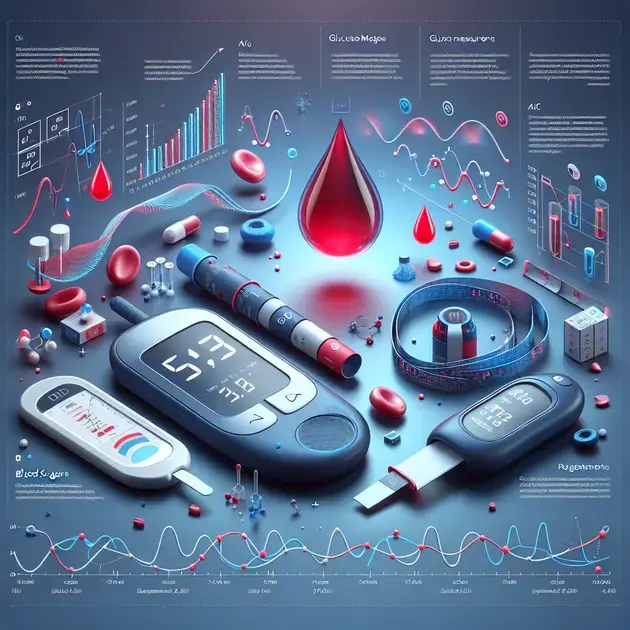Unlock the Link Between Blood Sugar Levels and A1C Measurements
Understanding the connection between blood sugar levels and A1C measurements is crucial in managing diabetes effectively. By deciphering how these two factors intertwine, individuals can take proactive steps towards improving their overall health and well-being. Delve into this insightful exploration to gain clarity on how monitoring blood sugar impacts A1C results and discover actionable strategies for better diabetes management.

Understanding the Relationship Between Blood Sugar Levels and A1C Measurements
In order to understand the connection between blood sugar levels and A1C measurements, it’s crucial to know that A1C represents the average blood sugar levels over the past 2-3 months. Monitoring blood sugar levels regularly, using devices such as glucose meters and continuous glucose monitors, can help individuals gain better control over their blood sugar. By tracking trends in blood sugar levels and making adjustments to diet, exercise, and medication as needed, it becomes possible to influence A1C measurements positively.
Several mobile applications are available, such as MySugr and Glucose Buddy, that allow users to log their blood sugar readings, meals, physical activity, and medication intake. These apps often provide insights through analysis of the data, offering tips on how to better manage blood sugar levels to achieve improved A1C results.
Additionally, consulting with healthcare professionals, such as endocrinologists and diabetes educators, can provide personalized guidance on how to interpret blood sugar readings in the context of A1C measurements. They can help individuals set realistic goals for blood sugar control and suggest appropriate lifestyle modifications to optimize A1C outcomes.
Regularly reviewing A1C results with healthcare providers is essential to assess the effectiveness of blood sugar management strategies and make necessary adjustments to treatment plans. Understanding the relationship between blood sugar levels and A1C measurements empowers individuals to take proactive steps towards better diabetes management and overall health.
By incorporating the insights gained from monitoring blood sugar levels into daily routines and leveraging the support of healthcare professionals, individuals can strive to achieve optimal A1C levels and reduce the risk of complications associated with uncontrolled diabetes.
Exploring the Impact of Blood Sugar Control on A1C Results
The impact of blood sugar control on A1C results is significant, as maintaining stable blood sugar levels within the target range can lead to improved A1C outcomes. Consistent efforts to manage blood sugar through balanced nutrition, regular exercise, and medication adherence can positively influence A1C measurements.
Using tools like insulin pumps or continuous glucose monitoring systems can aid in fine-tuning blood sugar control and ultimately impact A1C levels. These devices provide real-time data on blood sugar trends, enabling individuals to make timely adjustments to their diabetes management routines.
Websites like Dexcom and Freestyle Libre offer innovative technologies for continuous glucose monitoring, giving users the ability to track their blood sugar levels closely and identify patterns that may be affecting their A1C results. By utilizing such resources, individuals can gain valuable insights into their blood sugar control and make informed decisions to optimize their A1C values.
Educational resources, such as online courses on diabetes management and webinars hosted by healthcare professionals, can also enhance understanding of the relationship between blood sugar control and A1C measurements. These platforms provide up-to-date information on best practices for managing blood sugar and improving A1C outcomes.
Engaging in support groups or online forums focused on diabetes can create a sense of community and offer peer-to-peer encouragement in maintaining blood sugar control. Sharing experiences and learning from others’ strategies can aid individuals in sustaining motivation to achieve better A1C results and lead healthier lives.
Tips for Managing Blood Sugar to Improve A1C Levels
To effectively manage blood sugar levels and enhance A1C outcomes, it is crucial to prioritize healthy eating habits, regular physical activity, and medication adherence. Incorporating a balanced diet rich in fruits, vegetables, whole grains, and lean proteins can help regulate blood sugar and contribute to better A1C measurements.
Utilizing meal planning apps like MyFitnessPal and Yazio can assist individuals in tracking their food intake and making informed choices to control blood sugar levels. These apps offer nutritional information, meal suggestions, and personalized goal setting features to support users in managing their diet effectively for improved A1C control.
Engaging in regular exercise, such as walking, cycling, or strength training, can aid in lowering blood sugar levels and increasing insulin sensitivity. Fitness apps like Strava and Nike Training Club provide workout routines, progress tracking tools, and motivation to help individuals stay active and improve their overall blood sugar management.
Maintaining a consistent medication schedule as prescribed by healthcare providers is essential for optimizing blood sugar control and A1C outcomes. Setting reminders on medication management apps like Medisafe and Mango Health can help individuals stay on track with their treatment plans and ensure proper administration of medications for better diabetes management.
Monitoring blood sugar levels diligently, following personalized treatment plans, and staying informed about the latest developments in diabetes care are key strategies for managing blood sugar effectively and achieving desired A1C results. By implementing these tips and leveraging available resources, individuals can take proactive steps towards improving their overall health and well-being.

Optimizing Your Diet to Support Healthy Blood Sugar and A1C Levels
Optimizing your diet plays a crucial role in supporting healthy blood sugar levels and A1C. It is essential to focus on consuming a balanced diet rich in fiber, whole grains, lean proteins, healthy fats, and a variety of fruits and vegetables. These food choices can help regulate blood sugar levels and contribute to a lower A1C over time.
Incorporating complex carbohydrates, such as whole grains, into your diet can help prevent spikes in blood sugar levels. Additionally, consuming foods high in fiber can aid in slowing down the absorption of sugar into the bloodstream, promoting stable blood sugar levels and potentially impacting A1C results positively.
Protein-rich foods like lean meats, eggs, and legumes are essential for blood sugar management as they have a minimal impact on blood glucose levels. Including healthy fats from sources like avocados, nuts, and olive oil can also help improve insulin sensitivity and support overall blood sugar control.
Furthermore, paying attention to portion sizes and meal timing is key. Eating balanced meals at regular intervals throughout the day can prevent large fluctuations in blood sugar levels and support optimal A1C levels. Additionally, staying hydrated and avoiding sugary beverages can contribute to better blood sugar management.
Overall, making mindful food choices, focusing on nutrient-dense options, and maintaining a balanced diet can significantly impact your blood sugar levels and A1C in a positive way.
The Role of Exercise in Maintaining Stable Blood Sugar and A1C Levels
Exercise plays a vital role in maintaining stable blood sugar levels and A1C. Engaging in regular physical activity can help improve insulin sensitivity, allowing your body to better regulate blood glucose levels. Both aerobic exercises like walking, jogging, or cycling and strength training activities can be beneficial for managing blood sugar and A1C.
During exercise, your muscles utilize glucose for energy, which can help lower blood sugar levels and improve overall insulin sensitivity. Consistent physical activity not only has immediate effects on blood sugar but also contributes to long-term A1C management by promoting better glucose utilization and control.
Incorporating a variety of exercises into your routine can offer different benefits. Cardiovascular activities can help burn calories, improve cardiovascular health, and enhance insulin sensitivity. On the other hand, strength training exercises can build muscle mass, which can aid in glucose uptake and utilization, ultimately supporting healthy blood sugar levels.
It is essential to find activities that you enjoy and can sustain in the long term to ensure consistent exercise habits. Setting realistic goals, tracking your progress, and making exercise a part of your daily routine can help you effectively manage your blood sugar levels and A1C.
Remember to consult with your healthcare provider before starting any new exercise regimen, especially if you have underlying health conditions or are new to physical activity. By incorporating exercise into your lifestyle, you can support stable blood sugar levels and work towards maintaining a healthy A1C.
Understanding the Importance of Consistent Monitoring for Blood Sugar and A1C Management
Consistent monitoring of your blood sugar levels and A1C is essential for effective management and control of diabetes. Regularly checking your blood glucose levels using a glucometer can provide valuable insights into how your body is processing sugar. Monitoring before and after meals, as well as at different times of the day, can help you understand the impact of food, exercise, and medication on your blood sugar levels.
For individuals with diabetes, tracking A1C levels every few months is crucial in assessing long-term blood sugar control. The A1C test measures the average blood glucose levels over the past two to three months, offering an overview of how well your diabetes is being managed. By monitoring A1C regularly, you and your healthcare team can make informed decisions about treatment plans and lifestyle adjustments.
Consistency in monitoring is key to identifying trends and patterns in your blood sugar levels, allowing you to make timely adjustments to your diet, exercise, and medication as needed. Keeping a detailed record of your readings, symptoms, and activities can provide valuable information for your healthcare provider to optimize your diabetes management plan.
Additionally, regular monitoring can help detect potential complications early on, enabling prompt intervention and prevention of further health issues. By staying proactive and engaged in monitoring your blood sugar and A1C levels, you can take control of your diabetes management and work towards achieving your target goals for better health and well-being.
Remember to discuss your monitoring routine and results with your healthcare team regularly to ensure you are on track with your diabetes management plan and to address any concerns or questions you may have.
Conclusion
In understanding the relationship between blood sugar levels and A1C measurements, it becomes evident that consistent monitoring and proactive management are key to achieving optimal outcomes for diabetes control. By tracking blood sugar trends, making informed lifestyle choices, and utilizing available resources such as mobile applications, continuous glucose monitoring systems, and healthcare professional guidance, individuals can positively influence their A1C values and overall health.
Efforts toward managing blood sugar through diet optimization, regular exercise, and medication adherence play pivotal roles in improving A1C levels. Incorporating balanced nutrition, staying active with a variety of exercises, and maintaining consistent medication routines contribute to stable blood sugar control and better A1C outcomes over time.
Furthermore, recognizing the importance of continuous monitoring for blood sugar and A1C management is crucial for effective diabetes control. Regular check-ins with healthcare providers, tracking A1C levels, and diligent blood sugar monitoring provide valuable insights into one’s diabetes management progress. By staying proactive, identifying trends, and making necessary adjustments, individuals can work towards achieving their target goals for improved health and overall well-being.
Overall, the journey to managing blood sugar and A1C levels effectively involves a combination of mindful choices, informed decisions, and consistent monitoring. By embracing these strategies, individuals can take charge of their diabetes management, optimize their A1C results, and strive towards a healthier, more balanced lifestyle.